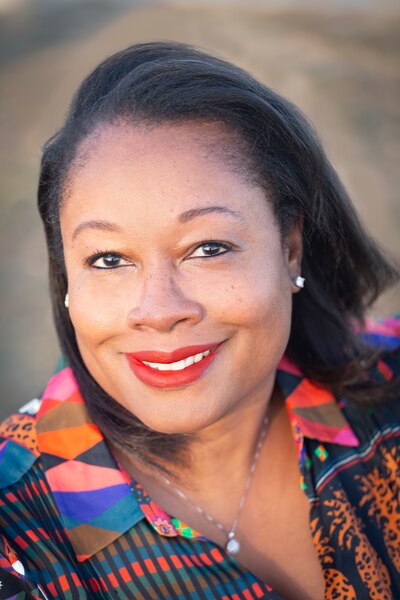In this moment in the nation, when anti-Blackness is so widespread, it is especially important for Black children to know that they are precious and brilliant. And one powerful way to affirm Blackness and Black identities is through reading.

Educator and multicultural scholar Rudine Sims Bishop provides a powerful metaphor for reading. She says that, sometimes, books can serve as mirrors, windows, and sliding-glass doors. Books can help us to see ourselves, look out into the world and learn about the experiences of others, and use our imaginations to become part of the world an author captures or creates.
An essential part of that metaphor is the way books can serve as mirrors that reflect the racial and cultural identities of the reader. Yet historically and presently, there have been too few books that mirror Black identities — too few books that center Black joy. This was a particular frustration for me, as a Black parent, when seeking out books for my daughter that were a reflection of her lived-experiences and a celebration of Blackness.
As parents and caregivers, we understand how important it is for children to read. And we also understand how important it is that Black children feel seen, valued, and loved in their reading lives. As Director of Diversity and Equity at the Teachers College Reading and Writing Project at Columbia University, my work in advancing antiracism in education begins by centering and honoring the lived experiences of students of color. So I specifically want to share the kind of books that affirm and celebrate Black identities. These are books that not only belong on bookshelves in our homes, classrooms, and school libraries. They should be an integral part of the curriculum.
Echoed across the research is that there are two things Black children need to further their emotional and academic development. First, is to develop strong racial and cultural identities. Second is opportunities to develop their critical consciousness. When inclusive, culturally responsive books are kept out of or are limited in the curriculum and on library shelves, the message becomes clear to all students about whose lives matter and whose don’t. Books offer powerful mirrors for Black children that are joyful to read in school and at home. Here’s what to consider.
Choose books that reinforce Black is beautiful.
Because racism is real, it’s possible your child has already experienced anti-Blackness directly. When my daughter was 4, she came home from nursery school as asked, “Why am I brown all over?” She asked this question in a way that absolutely let me know that something problematic happened in her pre-K classroom that day. And sure enough, I learned that she was told by a white peer that she could not play with her because she was “brown all over.”
Books can help us counter negative messages and provide empowering ones. For young children ages 4-7, reading aloud “Skin Again” by bell hooks, “The Skin You Live In” by Michael Tyler, and “Sulwe” by Lupita N’yongo help young Black children to recognize the beauty of their Black skin.
Similarly, Black hair is beautiful. And yet, the world often tries to tell us otherwise. “Hair Love” by Matthew Cherry, “Crown: An Ode To The Fresh Cut” by Derrick Barnes, and “Bippity Bop Barbershop” by Natasha Anastasia Tarpley are each powerful odes that affirm Black hair.
Reading books like these at home are important. They can help open up opportunities for children to talk to caregivers about any negative messages they’re wrestling with. They can give caregivers and parents opportunities to combat those messages with messages of love, affirmation, and joy. And they help to provide Black children with the protective armor they need to develop strong racial and cultural identities.
Find stories that feature dynamic characters.
When selecting books that increase the visibility of Black identities, choose books that present Black characters and people in dynamic ways, experiencing a range of emotions, and taking part in a variety of experiences. Avoid books that lean into stereotypes and, instead, select those that demonstrate the full humanity of Black people. Books that celebrate Blackness and help Black children feel seen include “All Because You Matter” and “Freedom Soup” both by Tami Charles, “I Am Every Good Thing,” another incredible book by Derrick Barnes, and “Saturday” by Oge Mora.
Books that feature Black characters riding skateboards, honoring their cultural identities, spending time with a parent enjoying their special bond, and more, validate the various experiences of Black children.
Tips for selecting books centered on Black joy:
Selecting books that center Black joy can help you and your child experience a celebration of Blackness as you read together. Think about:
- Characters — Look for books that present Black characters in a variety of ways so that Black children can imagine their past, present, and future. As previously mentioned, one thing that’s frustrating is the way society often presents Black identity as a singular thing. Select books that recognize the richness and diversity of Black identities.
- Family Structures — Look for books that are inclusive of many families, such as adoptive families, multiracial families, intergenerational family units, single-parents, and same-sex parents and caregivers.
- Communities — Select books that represent communities positively; that show the richness of communities, their strength and resilience. It’s important that stories do not limit a community’s past and present histories to oppression, but instead demonstrate the care and wisdom that exists within communities.
- Racial/Cultural Identities — Look for books where Black identities and cultures are presented powerfully and authentically. Select books that show the authentic ways Black people speak, where languages and traditions are presented accurately and respectfully.
Keep these resources in mind.
Black authors and illustrators understand the importance of celebrating Black identities. And they bring this nuanced, authentic understanding to the page. There are several ways to locate their work. Check with local libraries and bookstores. The following two websites are also helpful resources. The Brown Bookshelf focuses on raising awareness of the myriad Black voices writing for young readers. AALBC, is the oldest and largest online bookstore “dedicated to African American and Black literature from around the world.”
Books about Black characters and Black people are for ALL readers. And they are especially for Black children who deserve to feel seen and valued in the world.
Dr. Sonja Cherry-Paul is an author, consultant, and Director of Diversity and Equity at Teachers College Reading and Writing Project. She is also the co-founder and co-facilitator of the Institute for Racial Equity in Literacy.



